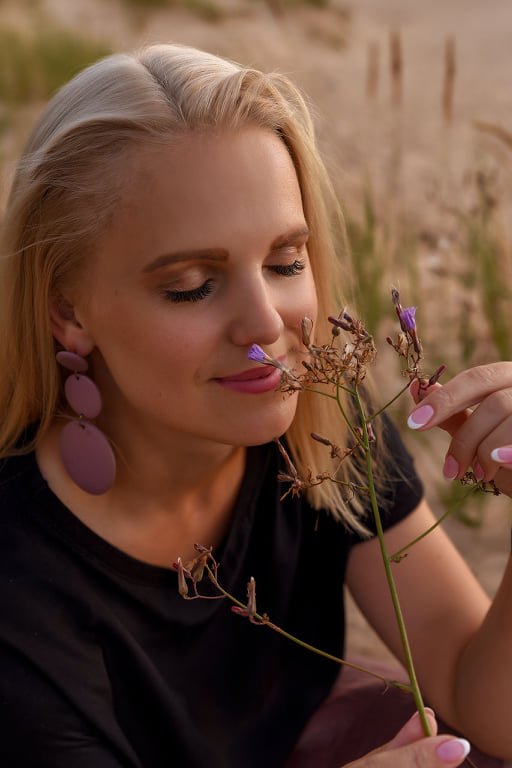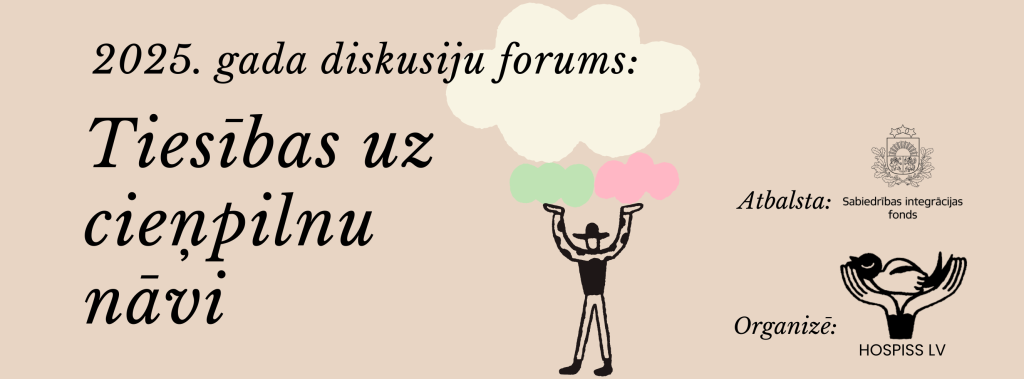Do everything to give you the chance to die beautiful
Interview with Zane Cingler, Hospiss LV volunteer
Author.
Date: 27.04.2022

What motivated you to volunteer?
The need for work for the heart. I felt that I was not fulfilling myself in my daily work. Listening to an interview with Ilse Neimane-Nespore from Hospiss LV (https://ugunsskola.lv/cilvekjauda83/), I realised it might be just what I needed. A job through which I could fulfil myself and find joy. The subject of hospice is quite close to my heart because I am an oncology patient myself and I have seen people die in inhuman conditions. Also, remembering my grandfather's passing, I can say that without special knowledge it is very difficult to take care of people in their last days. I imagine that, as much as I can, I would be happy to help to create a Hospice House - a place to die beautifully, regardless of age. This is an underdeveloped area in Latvia, so it definitely needs attention.
You mentioned your grandfather's passing, how did that happen?
My grandfather had a house where he lived alone. When he became more unwell, we took him to our flat, but he said he wanted to die at home. We took him back to the country home. We went to see him from time to time, but we could not be there all the time. Mum was the one who fed and bathed him. I had the feeling that he died alone. His greatest wish was that we should live in that house when he died. We did that, of course, but I think there was something else that he wanted, he just didn't tell us. I could see that he felt he was a burden on our family.
Another story is about a friend of mine who had cancer. She died in a hospice in England. Her mother said that it was a beautiful process, because hospice care in England is of a high standard. That would not be possible in Latvia.
I also remember my time in the Oncology Centre, which was not easy. Maybe that's one of the reasons why I want to work for Hospiss LV, because I've seen the situation from the inside and I want people who are destined to go to go beautifully
 What are your responsibilities at Hospiss LV?
What are your responsibilities at Hospiss LV?
I plan to raise funds to build a hospice house. There has to be a hospice house and I think what could help is to speak out about the hospice system and the need for a hospice house. People need to be told what it is and their fear of talking about death reduced.
How do you bring the topic of dying into your family and circle of friends?
We talk, but they mostly avoid. They pretend not to hear and switch to a completely different topic. People need to be educated, especially Latvians, who are closed and introverted. We should find original ways of talking about this, for example by sharing the experience of other countries.
I also have experience with palliative care patients. We were fundraising for a man I knew who had lateral sclerosis. The disease progressed slowly at first and then very rapidly. He was living in a social home where he was not treated in the best way. I remember very clearly the occasion when we went to congratulate him on his birthday. We wanted to make him happy because he was alone in his ward almost all the time. Although we raised funds to pay for him to be alone and to make him more comfortable, hardly anyone came to see him. You could see that when we went to see him, he didn't want us to leave. He really missed humanity, talking. The caregivers thought that the primary thing was to feed and wash him. Nobody cared how he felt. I suppose carers don't realise that this aspect is often more important than physical care. We wanted to give him humanity and joy. He didn't say much about what he wanted. I remember a situation when we thought of surprising him. He was still at home then. He was an organiser of international motocross competitions, so we secretly arranged for athletes who would be willing to come to his house with their bikes. His daughter took him out in a wheelchair and the athletes who agreed to take part in the surprise rode their bikes. We wanted him to be able to smell motocross one more time.
How did he feel?
He cried and was very moved. His wife also said that he had not been so happy for a very long time. The athletes then had the opportunity to thank him for what he had done for the development of the profession. It was very beautiful. We read out what he might like and what might please him. It is an indescribable feeling to bring joy even for a moment. It is very likely that the emotions he felt enabled him to live one day longer and with more quality. We hope that he lived for some time with the pleasant emotions and memories and enjoyed it, feeling that he was not alone. When he died, there was a race the next day. As he used to grow roses, we thought that each athlete could pin a white rose to his or her own mohawk. I remember that there were such beautiful clouds in the sky that day.
Is fulfilling and comforting the last wishes of dying people something you would like to do?
Yes, definitely! I would love it! It's a chance to get something positive back, to feel that you have done something worthwhile.
You mentioned the interview you listened to. Was that when you started Hospiss LV?
Yes. That's when I told Ilze from Hospiss LV what I could do and how I saw myself in this project. I have worked in journalism myself and I had the idea that I could write stories about people passing away or interview relatives, carers and Hospiss LV volunteers. It would be an opportunity to reach out to potential sponsors and volunteers. Hospiss LV needs a team of people from different backgrounds, such as a photographer or a hairdresser who can take the last beautiful picture or do the hair. I very much believe that this mechanism will start working.
Please tell us, what are your personal benefits of being involved in Hospiss LV?
Feeling like I can do more to help people. That I can give. When I posted different stories on Facebook, I received many positive messages from people thanking me for sharing, and someone also found my advice really helpful. I felt the satisfaction and joy of helping others. I only give my time and in return I get a big dose of positivity. It doesn't take much, but it makes a person happier for an hour or a day.
Tell me, when you were going through a difficult period in your life because of your illness, did you have people like this around you who were doing what you are trying to do now?
No, because people around me were scared of my diagnosis and are actually still afraid to talk about it. They are afraid to do or say anything that might hurt me, so they turn away, pretending that everything is fine. Now I have people around me who I can call when I feel bad. In fact, it takes very little - someone you can talk to, someone who will hug you and tell you that everything will be okay. To feel that you are not alone.
What do you think are your resources for Hospiss LV?
Warmth of heart, simplicity and communication, because I love talking to people.
What do you think would make the experience at Hospiss LV valuable for people?
Learning to give more than we ask and to appreciate more what we already have. It also teaches us to appreciate time and to do things today, because sometimes tomorrow may not come. We do not know how much time we have. That is why at Hospice LV we learn to appreciate the time given by seeing people die. Everything comes to an end, but the end can also be beautiful if it is taken care of.
 When you were ill, did you think much about death?
When you were ill, did you think much about death?
Yes. I thought about it a lot, because I was very scared. I was most afraid of who would take care of my children. When I saw people dying in the Oncology Centre, I realised that I did not want that. At that time, I didn't know there was any other solution. The Hospice House project is another solution and it allows you to die beautifully, whatever your age.
Did your involvement in Hospiss LV change your family's attitude to the topic of death?
No, they are still in denial. I believe that speaking out on this issue could reduce the denial. It should be spoken in the school environment, thus teaching children about death and telling them that it is not only old people who die. When my son was five years old, his great-grandmother died. We went to the hospital to say goodbye because the doctors said she would not live much longer. I took her with me then because I knew how important it was that my son could tell her what he wanted most. She was hooked up to machines. My son told her: "Grandma, I love you very, very much!" He took her hand and she shed a tear. A few days later she died. I told my son that this was happening. There were people around me who thought that you don't have to tell your child, you don't have to take your child to the funeral, because he is a baby. However, I had an inner feeling that I had to tell my child and introduce him to him. The more we (as adults) talk about it, the more we will educate our children.
What do you think has helped you to become so conscious about death?
It is my life's hardening, made up of my life's experiences and trials. I believe that it is more important for people to feel another person next to them, to feel humanity and, if you give something, to give it from the heart. We are afraid to tell each other how important you are to me, always putting it off. But these words strengthen us and those to whom we say them.
What would you wish for people thinking about volunteering with Hospiss LV?
Come and do, because we can only do if we are a big team, each of us specialised in one area. The only condition is that you must be a person with a heart. There are many very good and warm-hearted people in Latvia and Hospiss LV needs just that - a warm-hearted person. It is a job that gives a lot of positive emotions, even if the emotions come through tears. They are not tears of despair, but tears of joy that you have been able to make someone happy, even for a short moment.
